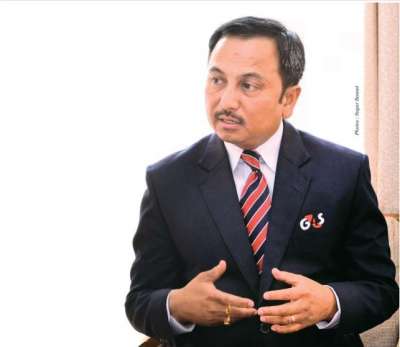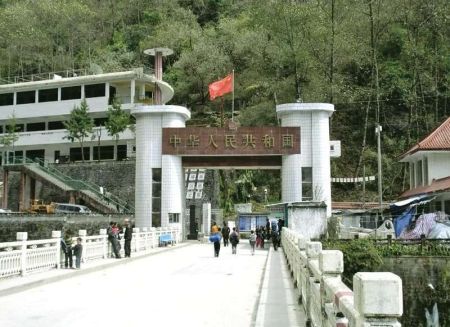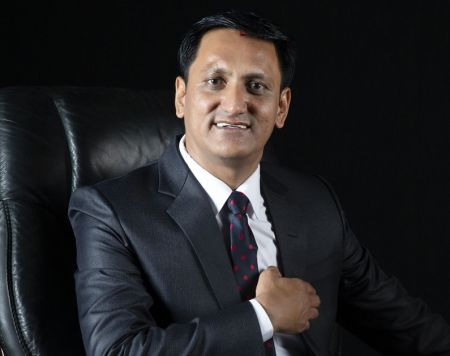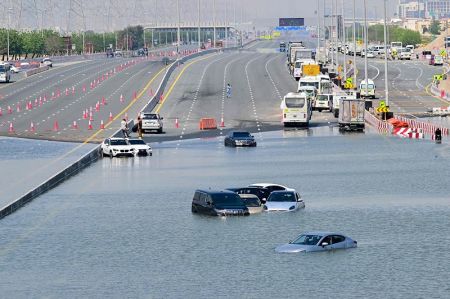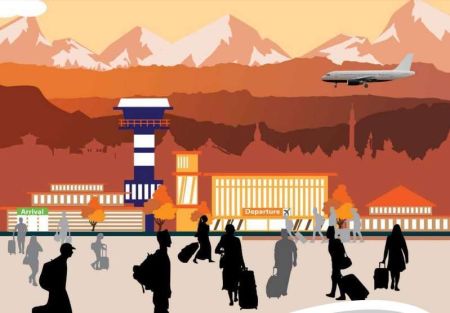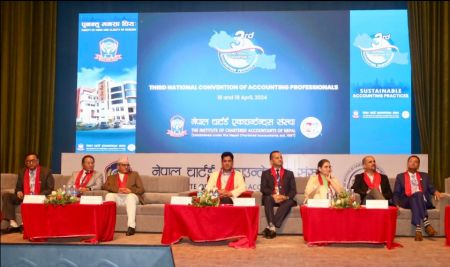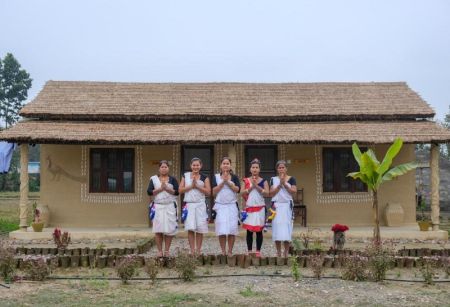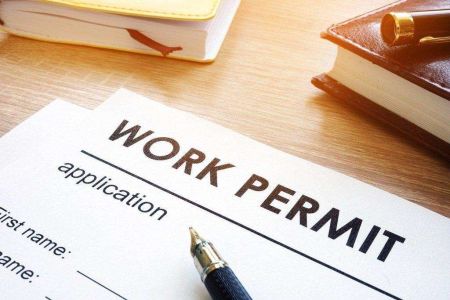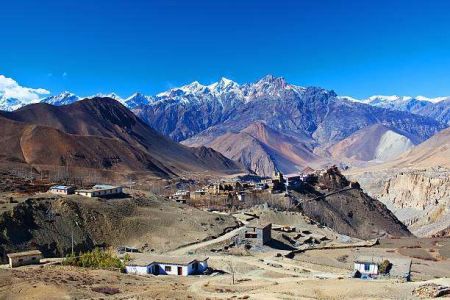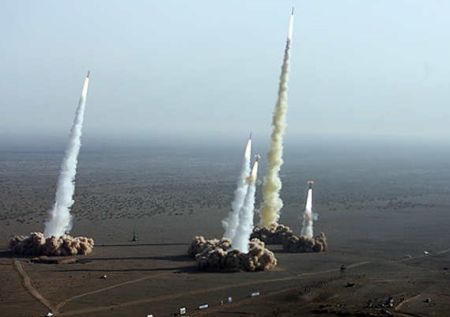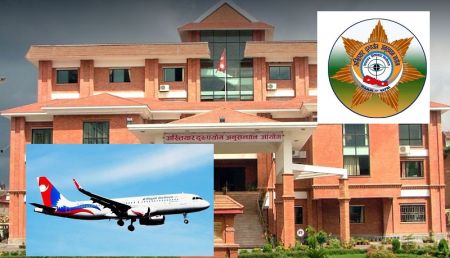We Need To Change Mindset To Think Big

Suraj Vaidya, the President of Vaidya's Organisation of Industries and Trading Houses (VOITH) is contesting the prestigious position of FNCCI President in an election being held during the FNCCI Annual General Meeting scheduled on 11-12 April 2011. In an interview with Pinaki Roy of New Business Age, Vaidya talked about the upcoming FNCCI elections and presented his views on reviving the ailing national economy. Excerpts:
The FNCCI elections this year come with a twist. The culture of consensus for the Senior Vice President to take over the reins has gone for a toss. Why so?
Well, we are going through a democratic system and democracy demands that we have more openness. FNCCI has always been a very open institution. New challenges bring new opportunities and therefore, we see more than just one candidate coming in for this election.
There has been a war of words of late between the CNI and FNCCI. How does it affect the private sector? Do you ever see the prospect of a single umbrella organisation?
I really don't think there is any war of words. The leaderships on both sides, at this stage, are looking at the smaller pie instead of a bigger one. We need to understand that the state of the economy is in an extremely fragile situation. With power cuts of over 12-18 hours a day, the interest rates coming up to about 17-18 per cent per annum, liquidity crunch in the market and the increasing demands of the labour, we need to regroup ourselves, re-focus and see the common agenda. We must then take it up in this new world of coopitition. We need to cooperate where we can and compete wherever we need to. If we agree on this basic fundamental, CNI can do what they need to and FNCCI can pursue its own agenda. We need to move forward together. Actually, we were one and so the concept of coming back together is always there. I see great possibility for us to come back. But FNCCI needs to first look at whether we can meet the expectations of our members who are so demanding today. People leave because they feel that they haven't been looked after. It is as simple as that. Therefore, if FNCCI improves its working relations, its services to the members and takes up the economic agenda as a leader of the nation, probably the members will come back and see the benefit of being part of the FNCCI. It's very possible that we can come back together if FNCCI takes the right leadership. That way we would be under a single umbrella one day again.
FNCCI has started sounding like a political organisation lately, trying to broker peace between the government and the opposition parties. Is this the kind of role FNCCI should be pursuing?
I have laid out a few tasks for myself if I get to the post of the FNCCI President. We need to talk economic development of the nation because fundamentally our mandate is to lobby and advocate for friendlier business environment in the country. This is our main agenda and to deviate from any of these issues would not be fruitful for the institution. FNCCI needs to be less active in politics but we need to be interactive with the political parties on economic development issues. Therefore, we will work with the political leadership on economic issues, national development, national budget and planning etc. We need to work with all the political parties as partners. But if it comes to carrying any 'ism', that's something FNCCI needs to stay far away from.
As a prominent business leader, how do you look at the overall state of the present economy?
The fundamental problem with the businesses and the industries is that the economic agenda so far has been overshadowed by political agenda. There has been less private sector initiative on taking leadership in this area. One of the things that I have set for myself if I come in as FNCCI President is that within six months, we will have an economic agenda which will talk about a very short term - three to five years-planning. It will give us a sense of direction as to where we think the government needs to lay more emphasis on, to create employment opportunities, to create a better investment environment and to be able to make it more profitable for businesses to operate. Once we have an economic agenda, we will go to the political parties and get their views on it. We will hopefully have a national economic agenda signed and accepted by all political parties to strengthen political understanding between them. So, I think the economic-political agenda led by the private sector is what is required today. And unless that happens, we are going to have a lot of problems. The mess that we have today is because the private sector has not been the engine of growth. It's been politics which is trying to be the engine of growth which is negative for the country. This is where we need to reform and move forward.
There is relative peace in the country, so to speak, after the end of hostilities. Why then are we not seeing any major investments? Where does the problem lie?
The example of the problem is very clear. It took us over seven months to find a prime minister. But people have started doubting how long will he be there. Business is a long term game. It's not that you make money today and walk out tomorrow. The fundamental requirement for any investment is sustained peace that helps to understand where the country's really heading to. It worries us when the parliament gets bogged down debating whether to use such words as 'private-public partnership'. When the political parties start showing hatred towards the very word 'private', it makes investments very uncomfortable. It gives an impression that the private sector can never be made a partner in the development programme. This message is reaching not only the Nepali investors but also to the foreign investors whereas FDI is so critically important to this country. If you look at the hydropower projects planned to be developed, a lot of Indian companies are either holding on to the projects or taking longer time to start them because of the inability to view the political-economic side of things. These are very critical issues that Nepal will have to address squarely in the coming days.
How about the possibility of a consensus among the candidates for FNCCI Presidentship? How exactly have you projected yourself for the position with your plan of action and manifesto, to lure the members?
My experience tells me that especially when the institution is going through a very difficult time, you tend to come together. But again there is a Nepali culture, a Nepali way of doing things. Democracy and freedom of association and thinking lead to an intellectual debate on how best we need to move forward. Six months ago, I sat with incumbent FNCCI President Kush Kumar Joshi and urged him to take the leadership in creating an environment where we have no elections right across. And I am not talking about the election for the post of President only but for the entire FNCCI. My concern is simple: if the country's new constitution is promulgated, FNCCI's laws and regulations will change drastically. We are not sure which districts, states and municipalities will fall under what areas once the country turns federal. Therefore, FNCCI's constitution itself will change and this will be a huge change through which we need to remain united. I have been trying to emphasise on this with the incumbent President for a long time now but haven't succeeded for whatever reasons. And now we are little over a month from the election date. Therefore, I find it difficult that there would be any understanding. So I am moving ahead on my own.
I have six very simple agenda: First, to provide better service to FNCCI members whereby getting their confidence and be more focused on FNCCI's work and not go beyond its mandate. The focus would be on the economic agenda and if we are able to do that, we would have provided services to the members. The members would mean the people from the districts, the commodity associations and the associate members. The second, to take leadership on the economic plan of this country. I think we have got too much of planning done for this country without real serious inputs from the private sector. FNCCI needs to make an economic vision which will not be a long term one. We are going through a very transitional phase so we need very short and medium term plans. My strategy would be to create an economic vision which would give a rebound to this depressive situation that we have. And hopefully work with the political parties and have the agenda accepted by all political parties whereby it would reflect on government policies for creating a better environment for business. That will be six months from the time I come in. The third agenda is energy. We all talk about the potentials of energy that we have. I am not going to be a politician saying we will bring 5,000 or 10,000 MW of power. But what I would say is that we would lobby and push and do everything possible to make investment in hydropower. We are going to push hard to get approved the electricity bill that has been sitting in the parliament for the last two years. We need laws that are investment friendly. We will urge the government to look at the supply and demand situation. The government needs to look at hydropower development as an area of national priority and give incentives to attract larger investments. The electricity tariff has not been revised for the last 10 years and it needs to be looked at seriously. We need to advise and work with the government on whether it is workable to continue to have NEA responsible for producing, selling as well as managing power. The electricity losses of 18-20 percent are unacceptable to the nation.

Number four would be fiscal discipline for which the private sector first needs to be open and transparent in the way we do business. And we will try and encourage that as much as possible. The last three budgets did not come on time and the government has not been able to rescue the country's economy. In fact, the delay in budget is one of the reasons why the interest rate has gone up so high. The funds have not gone to the districts for development expenditure and as a result, we are lagging behind. Fiscal discipline on our side definitely needs to be looked at but we would also lobby and bring to the attention of the Nepali people, the government's long vision or whatever it may be. Number five, I want to go to the trade unions as partners. We need to sit and plan on how we can create a better investment situation in this country. The labour relation is extremely important to build confidence for investors. We need to see if we can retain the Nepali people leaving the country. We want to improve working relations with the trade unions and the two agenda to look at are linking wages with productivity and linking social security with flexibility. If we can work out these two agenda, we can achieve a lot with the trade unions.
The last point is that Nepal needs to brand itself as an attractive destination because the existing capital in this country would not be sufficient to rebound the economy. So, we need FDI in this country and need to look at India and China as our primary partners for kick starting our economy. I would be taking a lot of delegations to India and China to market Nepal as a friendly and attractive destination in the areas of hydropower investment and tourism. I think these are areas that would help Nepal come back quickly. Therefore, focusing on India and China as partners for Nepal's development is extremely critical. These are the six primary agenda that I have if I become the next FNCCI president.
Why are you contesting the FNCCI President's post, in the first place? Why are you in the fray at all?
I have been with FNCCI for the last 25 years and have been the Vice President thrice. I am now the Senior Vice President and I really need to move up or leave the space for some other friends who want to come in. More importantly, the new leadership of FNCCI from coming April will be directly responsible for what's going to happen in about two months from there. That is the time when new Constitution is expected to be promulgated though we don't know whether the constitution will be really promulgated. Economy and development will be important agenda that time. Therefore, the FNCCI leadership needs to be mature and determined enough to take on those challenges. I am prepared for that. I see several reasons why the economy has not been at the forefront. In the New Nepal, the economy must be in the forefront. I am concerned about the inflation that's up from 8.5 per cent last year to 14.6 per cent now and the slowdown in the industrial output from 4 per cent to 1.8 per cent. These are all extremely worrying symptoms and I feel I can face these challenges and also come up with an amicable result which will enhance FNCCI's image.
The image of the business community has been badly tainted by the fake VAT bills episode. How do you view this? What, according to you, can be the course of correction?
I think the private sector has owned it up saying that it is a part of corruption that is going on in the country. But the government and the system itself need to acknowledge that they too are involved in this and therefore, we need to work together to find a solution and get out of this. It's important for us to understand that institutions like FNCCI will stand by the law of the land. If there is any forgery which affects the nation at large, FNCCI needs to take up this issue. By the same token, the government needs to understand that they are also part of it. Such corruption and forgery wouldn't have occurred just by the efforts of only one side. So, the other side too needs to own up and say what they plan to do regarding this.
We have witnessed a shift from manufacturing to service industry in recent times. What could be the possible reasons?
Nepal needs to revisit itself and re-understand where our sustainable areas of potential investments are. The industrial growth has declined from 4 per cent to 1.8 per cent mainly because we have power shortage and frequent strikes. There have been labour disputes and political interference in large investment businesses. Therefore there are large projects such as the hydropower projects that are intended but haven't really materialised. What is discouraging investment into these areas is lack of foresightedness. How long is Nepal going to wait for things to really happen and to have a stable government that will last beyond a few months? And until Nepal shows that leadership, I think investment in manufacturing is not going to increase. It is a wishful thinking at best and therefore, service industry is something that is but natural. Nepal needs to look at Singapore, Switzerland and Hong Kong which are very small nations lying between large industrial countries. We need to see if we can imitate their success by providing services to bigger countries whereby we can increase our niche in the market and improve the economic condition of this country. So, the service industry is going to be a very important part of Nepal in times to come.
How does the FNCCI and the private sector plan to revive the ailing national economy?
We need to be positive and work with the media and the government in saying that Nepal is not a poor country. Nepal has tremendous future and potential so the fundamental thing is to change our mindset from thinking poor to thinking big. This will help us initiate a new beginning. Nepal needs to seriously look at how we can generate investment here to employ the 500-700 Nepali people leaving this country on a daily basis because the youth who would make the future of Nepal and the people who have knowledge are leaving us. The doctors, engineers, scientists and businessman-they are all leaving us. Therefore, we need to create a positive environment in this country to try and retain them. This is going to be critically important in the coming years. Nepal needs to look at its niche strength which is human capital. It needs to look at the growth of India and China. They are going to be the world's largest economies by 2020. Nepal needs to be able to make a strategy on how to benefit from the growth of these economies on the two sides of our country. If we focus on that, we would be able to quickly come out of our problems. We need to have a focused vision and short term plan for revival. We also need to try and create employment and good labour relations. At FNCCI, we need to work with the trade unions as partners - we should be people sitting on the same side of the table, not on the opposite sides. If we are all in this together, it will be critically important for us to move forward.
Some of the projects initiated by the FNCCI lately have failed miserably. It is operating more like an NGO implementing independent projects. Shouldn't FNCCI be taking the lead to envision what is in the best interest of Nepali economy?
Human resource is extremely critical and I want to link this with the FNCCI running a lot of training schools across the country. I think the reason we have not been able to create a sense of success is because we ourselves haven't really focused on exactly what kind of human resource we need to develop. The fundamental issue is what are we training, who are we training and what is the purpose of that training. FNCCI needs to be active in many areas. The JITCO programme which is sending Nepali people to Japan has not been very successful. It's a Japanese company that comes here, interviews people and recruits them. FNCCI is purely mediating this. It probably needs to be in the forefront and take the leadership. I think unless we take leadership, we should not be involved in any such programme.
Would you like to add anything as a message?
Yes, a message to the leaders. It's high time they understand that politics is not the primary concern of the Nepali people. We are worried as Nepali citizens because it's being projected that next year, there is going to be a food shortage of 400,000 tonnes in this country. With remittance declining, our economy is going to be badly hit. The kind of queues that we see outside the foreign ministry for passports speaks loudly about the confidence of the Nepali people on the country's leadership. Therefore, it's time for them to get off the political agenda and start working on economy because this is the only thing that is going to get the country back on a sustainable basis in a long term. We should get peace and understanding so we want them to treat economy as the primary agenda and the most important thing to get the country back from the state that we are in.


